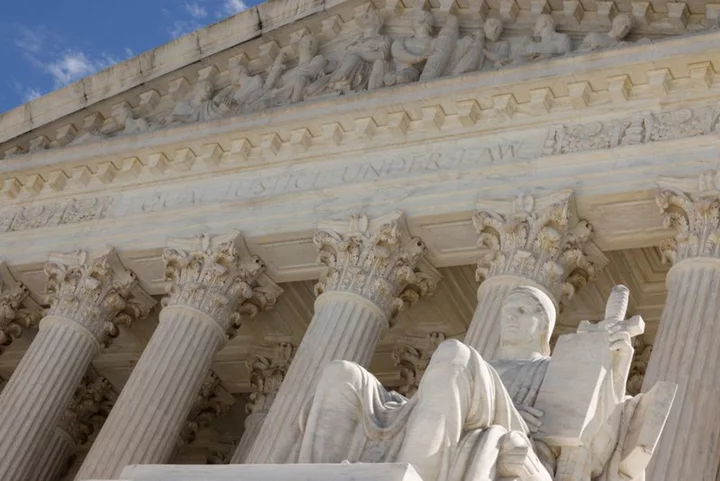By Andrew Chung
(Reuters) -The U.S. Supreme Court on Friday agreed to decide the legality of Republican-backed state laws in Texas and Florida that constrain the ability of social media companies to curb content on their platforms that these businesses deem objectionable.
The justices took up two cases involving challenges by technology industry groups who argued that these 2021 laws restricting content-moderation practices of large social media platforms violate the U.S. Constitution's First Amendment protections for freedom of speech. Lower courts split on the issue, striking down key provisions of Florida's law while upholding the Texas measure.
The industry challengers to the 2021 laws are NetChoice and the Computer & Communications Industry Association, industry groups whose members include Facebook parent Meta Platforms Inc, Alphabet Inc's Google, which owns YouTube, as well as TikTok and X, formerly called Twitter.
Supporters of the laws have argued that social media platforms have engaged in impermissible censorship and have silenced conservative voices in particular. Advocates of content moderation have argued for the need to stop misinformation and the amplification of extremist causes.
President Joe Biden's administration told the justices in a court filing that the cases merit review because the laws burden the rights of the companies.
"When a social-media platform selects, edits and arranges third-party speech for presentation to the public, it engages in activity protected by the First Amendment," the Justice Department said.
The cases test the argument made by the industry groups that the First Amendment protects the editorial discretion of the social media platforms and prohibits governments from forcing companies to publish content against their will. The companies have said that without editorial discretion their websites would be overrun with spam, bullying, extremism and hate speech.
Conservative critics of "Big Tech" companies have cited as an example of what they called censorship the decision by the platform previously called Twitter to suspend then-President Donald Trump shortly after the Jan. 6, 2021, attack on the U.S. Capitol by his supporters, with the company citing "the risk of further incitement of violence." Trump's account has since been reinstated under Elon Musk, who now owns the renamed company.
In signing the bill in 2021, Texas Governor Greg Abbott said, "There is a dangerous movement by some social media companies to silence conservative ideas and values. This is wrong and we will not allow it in Texas."
The Texas law forbids social media companies with at least 50 million monthly active users from acting to "censor" users based on "viewpoint," and allows either users or the Texas attorney general to sue to enforce it.
Florida's law requires large platforms to "host some speech that they might otherwise prefer not to host" by prohibiting the censorship or banning of a political candidate or "journalistic enterprise."
The laws also impose disclosure requirements that the platforms call onerous.
Florida is seeking to revive its law after the Atlanta-based 11th U.S. Circuit Court of Appeals ruled largely against it. The industry groups are appealing a decision by the New Orleans-based 5th U.S. Circuit Court of Appeals upholding the Texas law, which the Supreme Court had blocked at an earlier stage of the case.
(Reporting by Andrew Chung in New York; Editing by Will Dunham)

